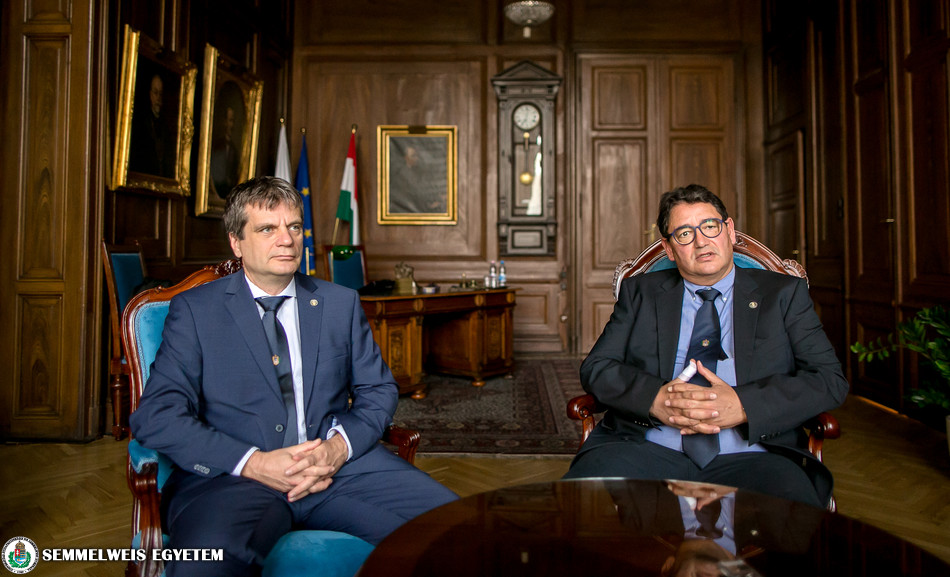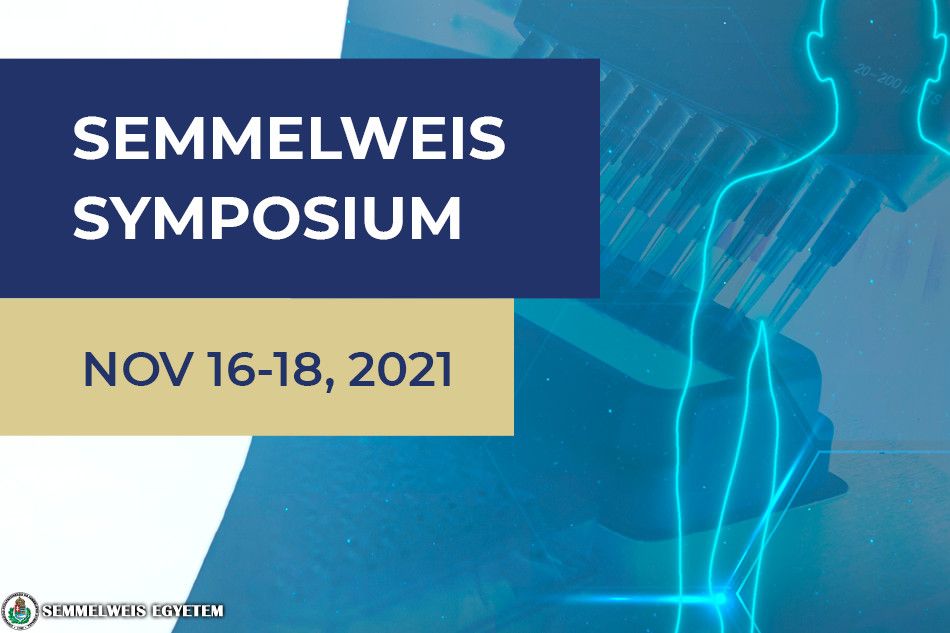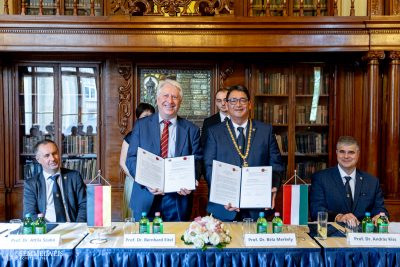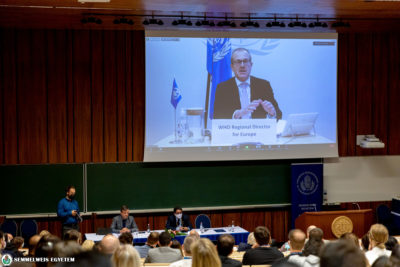“Clinical research is essential in developing new therapies and innovations, and thus in providing the most effective care for our patients. Increasing the number of clinical trials, which is an important goal for Semmelweis University, will also increase our scientific performance and contribute to further advancement in the rankings,” emphasized Rector Dr. Béla Merkely, who is the main organizer of this year’s symposium together with Dr. Péter Ferdinandy, Vice Rector for Science and Innovation. Translational medicine will be of key focus in the program, with the aim of bringing discoveries to the bedside as soon as possible.
The symposium is traditionally the most prestigious international scientific event at Semmelweis University. At the event, participants can learn about the latest scientific results and innovations in a given field, and the program also provides an opportunity to expand international cooperation and build relationships with partners in industry.
Semmelweis University already has a large number of clinical trials underway, but there is still potential to increase the quantity and quality of these
– Dr. Péter Ferdinandy said about this year’s theme. He added that this year the Clinical Research Coordination Center (4K) was established under the leadership of Dr. János Filakovszky, which will also be presented at the event. The speakers include university staff as well as international experts, who will deliver more than 50 presentations organized around 6 major themes.

The first day will introduce, among others, the three accredited Phase I centers of Semmelweis University, located at the Department of Internal Medicine and Oncology, the 1st Department of Pediatrics and the Városmajor Heart and Vascular Center. An investigational medicinal product is first used in Phase I trials involving patients, which adhere to very strict regulatory rules and require a very high level of professionalism, equipment and staff. In addition to presenting the experience gained at university level, international speakers will also discuss this field.
Several sessions will address the COVID-19 pandemic. The pandemic has brought about a number of changes and new procedures in drug development and clinical trials (e.g. digitization in administration and the appearance of telemedicine) that can make the process more efficient. The university has also played a major role in research on COVID, which is also the subject of several presentations.
Dr. Oren Cohen is among the leading international speakers, who, in addition to being a professor at Duke University in the United States, is the head of Phase I trials at Labcorp, a company specializing in the organization of clinical trials. In his presentation he will talk about the role of science in new drug development and the relationship between academic research and industry drug development. Dr. András Maifeld is coming from Germany to represent the Charité University’s Phase I trial organization.
Dr. Axel Stang, Professor at the Asklepios Klinik Barmbek, part of the Asklepios network of hospitals in Germany, will talk about his experience with large number of clinical trials. Agneska Gackowska, global head of the network of Parexel research sites, with which Semmelweis University has an important partnership, will speak about the future role and responsibilities of the academy’s research sites and industry expectations.
Participation in the Semmelweis Symposium will earn 1 credit point for PhD students and members of the Students’ Scientific Association, while poster session participants will receive 2 credits and winners 3 credits. The symposium as a continuing education course is worth 50 credits for Hungarian doctors and pharmacists. Dr. Péter Ferdinandy, Vice Rector, recommends participation for anyone involved or interested in clinical research, especially residents, PhD and other students, internists, cardiologists, pediatricians and clinical pharmacologists.
The Hungarian and international regulatory framework for clinical trials will be discussed in a round-table discussion organized jointly with the Hungarian Society of Experimental and Clinical Pharmacology, which is a particularly hot topic in light of the European framework that will be amended next year. Among others, Dr. Mátyás Szentiványi, Director General of OGYEI, and Martina Schuessler Lenz and Ilona G. Reisch from the European Medicines Agency (EMA) will be present.
There will be a special session dedicated to the future role of academic centers in clinical trials and translational medicine, i.e. how we can translate discoveries made in the laboratory into clinical practice as quickly as possible. Cardiology, surgery and pediatrics, which are the areas where clinical and translational research and innovation are particularly strong at Semmelweis University, will be presented in separate blocks
The members of the symposium’s operational organizing committee are Dr. János Filakovszky (4K), Dr. Péter Hegyi (Translational Medicine Center), Dr. Attila Kovács, Dr. Tamás Radovits (Városmajor Heart and Vascular Center), Dr. Attila Szijártó (Department of Surgery, Transplantation and Gastroenterology), and Dr. Attila Szabó (1st Department of Pediatrics).
The 3-day event will be held in English at the Basic Medical Science Center. Participation is free of charge but registration is required. Registration is possible via the program website.
Click here for the detailed program.
Pálma Dobozi
Translation: Tamás Deme



